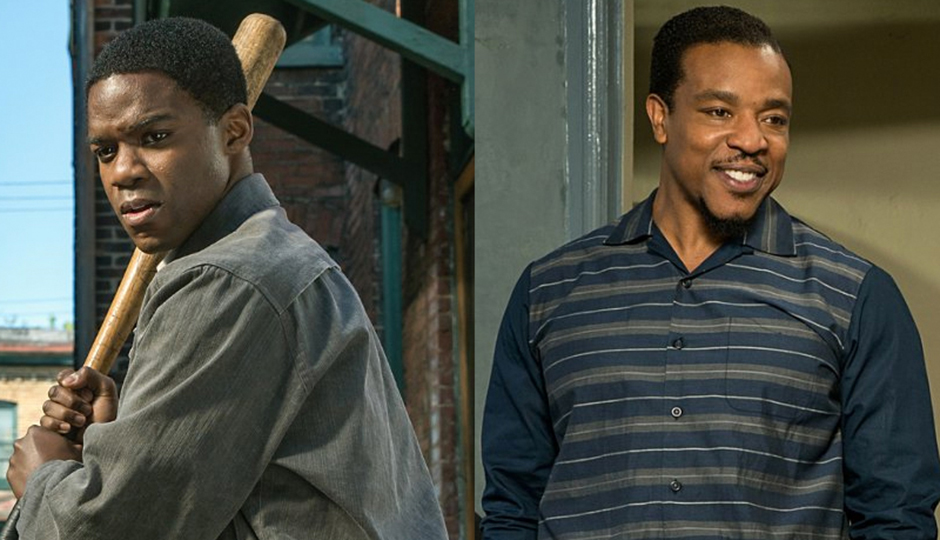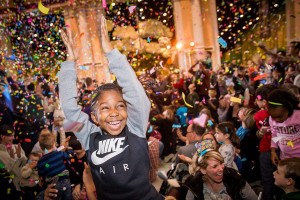5 Questions: Jovan Adepo and Russell Hornsby on Fences

Jovan Adepo, left, and Russell Hornsby in Fences. Photo courtesy of David Lee/Paramount Pictures
It’s not every actor who gets to work with truly legendary figures, and fewer still who get to work with such luminaries while also being directed by them. But that was the situation for Jovan Adepo and Russell Hornsby, a pair of gifted thespians who got to make the film adaption of the August Wilson play Fences, working alongside – and for – co-star and director Denzel Washington.
Reprising his leading role from a much rhapsodized Broadway production, Washington, along with stage co-star Viola Davis, meticulously choreographed the play so that it would take advantage of the more free-flowing visual cinematic form. He also surrounded himself with sterling young talent, including Adepo and Hornsby, who both play sons of Washington’s indelible Troy Maxon, albeit with different mothers. Recently, the pair of actors were in town to discuss the play, the genius of Wilson’s words, and what it was like to work with Hollywood royalty.
As they’re such different forms, it’s not always easy to adapt a play into a film. Were you aware of having to make this somehow less theatrical and more cinematic?
Russel Hornsby: I think that the film asks audiences to do something that they haven’t been asked to do in quite a number of years: to have patience. Let the story develop. I think audiences aren’t used to actually sitting down and watching a story unfold and watching characters develop over time. We’re telling a story about family, so we have to see how each individual character reacts to each different family member because what so-and-so said affects how you feel and how you’re gonna react.
Jovan Adepo: Russell, to piggyback, you remember that’s what Denzel said in one of the Q&A’s. That’s the whole reason why he started the film out from black. He wanted people to listen to the words first, versus “Boom! Let’s watch the film.”
I’m not sure who it was, but I remember an actor who did both mediums coming off a movie and saying he was looking forward to returning to the stage where he could act with “more than his eyes.” Is that what it’s like?
RH: Was it Kevin Kline? We had to take the film out of the backyard, put it in the house, put it in the front yard. We had to take them and put them at work at a bar. That’s cinema. It’s not necessarily the theatrics. It’s that the characters [August Wilson] wrote are three-dimensional: They force you to engage and really react. You need to see how they react with legs and arms and everything because, culturally specifically, we are people who live in our bodies. We live in our whole body. We don’t just live up here [points to head].
Wilson is such a sharp writer — his characters are so fully conceived on the page. Does it make it exciting as an actor to know almost exactly who they are and how to approach the material, or do you like it being more wide-open?
JA: I think it depends on the story as a whole. August Wilson was a listener, an observer of people. He’s writing in a voice that’s very specific, so you want to stay on what he gives you because he’s writing them that way for a reason. I think the best thing for an actor who’s approaching his work is to stay close to the material.
RH: These aren’t archetypes. These are specific people. That’s why they jump up off the page. He chose to pair these seven people for a reason, to tell their story. Not you telling your story. You’re telling it through them and you have to be eyes to the character. August Wilson is for everybody, but not everybody can play August Wilson, because it requires you to honor that part of our culture that people may be embarrassed by. If you’re not embarrassed, if you’re not afraid, and if you have a willingness to step into it and embody it, then you can tell the stories, but if not, it’ll show.
Is it peculiar to work with an actor who is also directing you, and one, in this case, who has received such celebration for his performance in the role?
JA: I didn’t see that as a drawback for me, I think, because this was my first feature. It was just like having a teacher all the time, which is exactly what I was hoping for. It was only beneficial to have somebody I could look to for guidance at any given moment in the scene, to make sure that I was always focused and not getting ahead of myself. If he ever felt like I could have made a stronger choice, he would never beat me to the punch and give me the answer. He’d shake my hand and walk away, saying, “You figure it out. I’m gonna leave you alone ’cause I know you got it already.”
There is a very specific cultural reference point in the work – it’s set in a very specific time and place and within an extremely particular race and class distinction – but there’s also something universal to Wilson’s work, a sense that everyone can experience what his characters experience. Do you see this work as specific, in that sense, or more of a universal connection between all of us?
RH: I think we get to the universal through the specific. We have to be specific to these African-American people and then we can serve the universal, but we have to tell our story, our way. That’s what August chose to do. Our rhythms are different. Our way is different. How we say “Good morning” and how we say “Good night” is different, but everybody says “Good morning” and “Good night.” I think that’s very important. Yes, it’s a human story, but it’s our story told our way and we need to do that for us. We do the art for the people, but on the art’s terms. Then, whatever you take from it, if it’s done right, if it’s done truthfully, you will get something from it.
Fences opens wide on Christmas Day.
Piers Marchant is a film critic and writer based in Philly. Find more confounding amusements and diversions at his blog, Sweet Smell of Success, or read his further 142-character rants and ravings at @kafkaesque83.


